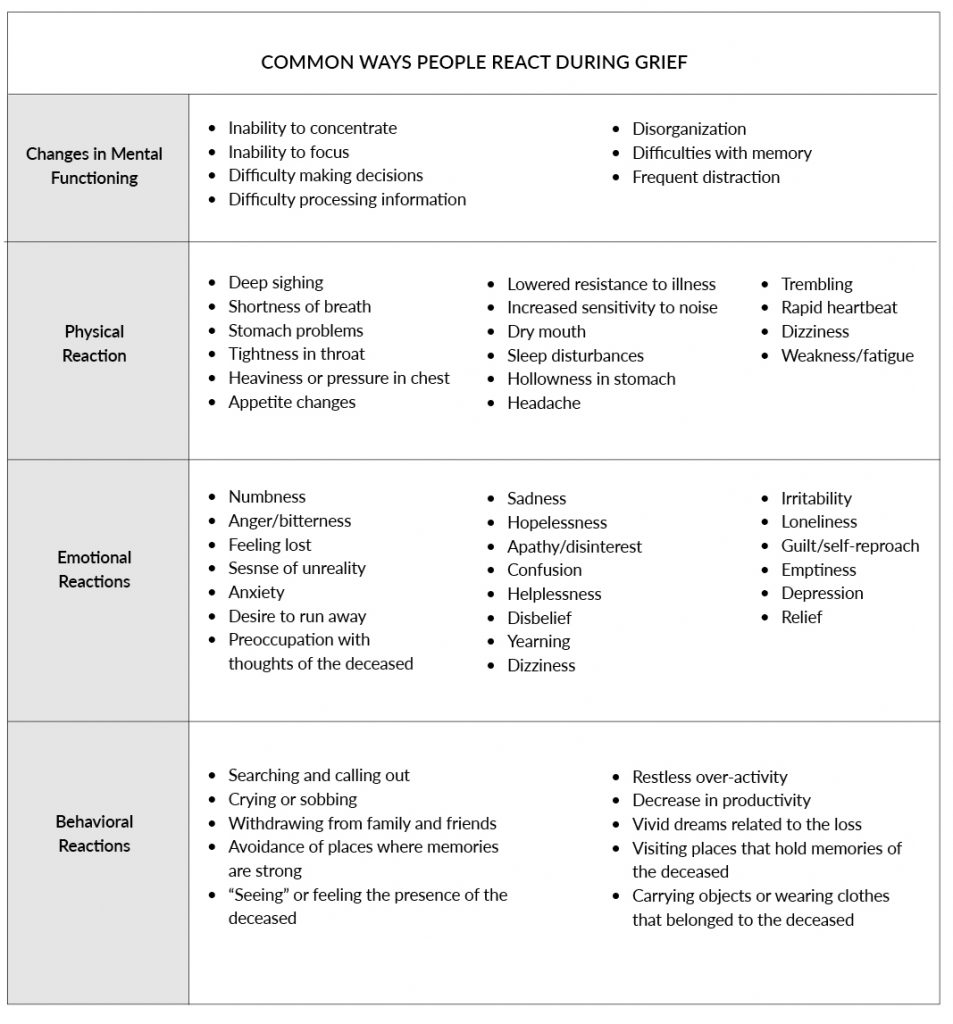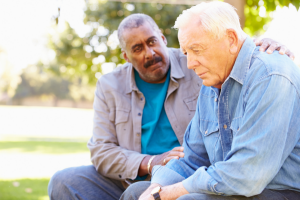
Grief
Grief is the most common feeling experienced by anyone affected by death. It is normal after a loved one’s death.
You may experience anticipatory grief, which is grieving associated with an expected event.
In this case, you are aware of and will be grieving your loved one’s impending death and you may be grieving about additional things personal to you.
- You may be losing the life you planned and expected with your loved one.
- You may be losing the person you loved as the illness progresses.
- There may already be things you may have lost, such as your lifestyle, your freedom, your interest in doing the things you enjoy, or seeing your friends.
- There may be an emotional distance developing between you and those who are not coping well that can be isolating.
 Grief is a very personal process and there is no right way to do it. Grief can be a long and difficult process full of ups and downs, relapses, confusion, and changing hopes for the future. Your family and friends will also be grieving about what you are going through and the loss of someone who is their loved one as well.
Grief is a very personal process and there is no right way to do it. Grief can be a long and difficult process full of ups and downs, relapses, confusion, and changing hopes for the future. Your family and friends will also be grieving about what you are going through and the loss of someone who is their loved one as well.
- Grief can manifest physically, emotionally, and psychologically.
- Other emotions that can be experienced along with grief include shock, sadness, fear, anger, guilt, and regret. The ebb and flow of feelings can sometimes make it seem like you are on a roller coaster.
- You may resent your new situation of having to go on without them and envy those who still have what you no longer do, even to the point of isolating yourself from them.
- Grief can result in obsessions about your loved one or death, prolonged anxiety, trouble thinking and concentrating, restlessness, withdrawal, helplessness, depression, guilt, and/or thoughts of suicide.
- Physical symptoms are common and may include: crying, abdominal pain, loss of appetite, intestinal upsets, weight loss, sleep disturbances, headaches, chest or throat tightness, dizziness, and/or extreme fatigue.
- Anniversaries, birthdays, holidays, and milestones can intensify grief or trigger a significant grief reaction even if you have previously dealt with your loss.
- Grieving can make you vulnerable to those who want to manipulate or take advantage of you.
The well known Kübler-Ross model “Stages of Grief” is a good guide of how feelings and emotions can be mixed together and change over time. Originally, there were five stages of grief observed, but the model has since been updated to include a total of seven stages.
Many grieving people will go through all of these stages, but not everyone will. Each of us experiences the stages of grief in different orders, intensities, and lengths of time. Often the stages overlap and may even take place at the same time. Denial tends to come first and acceptance is typically the last stage.
Traditional Five Stages of Grief
The well known Kübler-Ross model known as “the Five Stages of Grief” is a good guide of how feelings and emotions can be jumbled together and change over time. Some or all of the following may be seen when you are grieving.

Updated Seven Stages of Grief
Dr. Kübler-Ross later refined her model to include seven stages of loss. For this updated guide, there are an additional emotional stage (stage 2) that includes pain and guilt and two stages (5 and 6) that describe the ebb and flow of emotions over time during the recovery process. Three stages now combine a milestone with the predominant emotion during that stage, shock and denial, anger and bargaining, and acceptance and hope.

Shock and Denial
This stage recognizes that denial is usually a result of a state of shock, disbelief, and numbed feelings. Inability to accept your loss may lead to overwhelming longing for your loved one or even the belief they are still alive.
Pain and Guilt
In this stage you are now reacting to the situation and may feel that the loss is unbearable, and guilty that you’re making loved ones’ lives harder because of your situation. You may also feel guilt about lost opportunities with, previous treatment of, and negative feelings toward your loved one.
Anger and Bargaining
This stage recognizes that anger is the most likely emotion to make you want to bargain. You may lash out at those around you or reach to a higher power, offering anything in exchange for relief from your feelings and illness.
Depression
Depression is not always a psychological condition, but a normal emotional reaction to loss. It usually happens when you are feeling overwhelmed and helpless. This may be a period of isolation and loneliness during which you process and reflect on the loss.
The Upward Turn
This new stage reflects the ups and downs of grief and recognizes that there is a point that things do improve. During this stage anger and pain have died down, and you’re left in a more calm and relaxed state.
Reconstruction and Working Through
This is a new stage that recognizes that you can begin to move forward before you have fully accepted your situation. Although there are ups and downs, you are now able to start putting pieces of your life back together and carry on.
Acceptance and Hope
This stage now combines the feeling of hope with acceptance. For those facing the end of their life, it is the time when you accept the prognosis and begin the process of making life more comfortable. For those who have lost a loved one it is a time when they become more optimistic about their lives without their lost loved one.
Associated Emotions
 There are many powerful emotions that are mixed into the grieving process. Some or all of them may be experienced while you are grieving. You may need to deal with them before you can move onto another stage. There are general ways to cope, such as talking with sympathetic friends, loved ones, or others who are going through similar experiences, attending support groups, and/or reading books or listening to recorded material that may be a guide through grief. In many cases there may be specific ways to help relieve or channel certain emotions or feelings.
There are many powerful emotions that are mixed into the grieving process. Some or all of them may be experienced while you are grieving. You may need to deal with them before you can move onto another stage. There are general ways to cope, such as talking with sympathetic friends, loved ones, or others who are going through similar experiences, attending support groups, and/or reading books or listening to recorded material that may be a guide through grief. In many cases there may be specific ways to help relieve or channel certain emotions or feelings.
Fear
There are many fears that can be associated with the death of a loved one, such as being afraid:
- You will not be able cope and/or carry on;
- To become a burden to loved ones;
- That your life will have no purpose or meaning without your loved one;
- That you will lose your self-image; and/or
- You will not be able to support yourself and/or your family.
In some cases knowing what you fear can help you face it and manage it.
- If you’re afraid of being alone, share this with your family and loved ones so they know the supportive value of spending time with you.
- Allow your family to reassure you that you are not a burden.
- Share your life with family and friends, which can affirm that your life still has meaning and help you maintain your self-image.
Anger
While a common stage of grief, anger is also a powerful emotion.
- It’s normal to be angry about death, especially if it is sudden or due to an unexpected illness.
- Anger is frequently a result of frustration, anxiety, loneliness, or uncertainty. It may be associated with agitation, weakness, crying, aimless or disorganized activities, envy at seeing others with their loved ones, or preoccupation with thoughts about life not being fair.
- Expression of your anger is normal. Although anger can interfere with your interaction with others and recovery, it can be used in a positive way to motivate yourself to solve problems and take action to get what you need.
Loss
When you are losing or have lost a loved one there are many types of loss you experience other than the loss of the person. Secondary losses can include the loss of your identity (parent, spouse, or best friend), lifestyle, and the feeling that you have lost your future and purpose in life.
- Loss is maladaptive when you feel as though you will never have answers and/or there will always be something missing. You may feel stuck and unable to move forward in the grieving process.
- To others you are physically present but not there psychologically. You may even hold on to your loved one’s memory to the point of not fully accepting their death.
- In these situations it is even more important to maintain contact with others and seek out support groups.
- If you are having trouble controlling your thoughts and behaviors and/or have marked distress for an extended period of time, seek professional help.
Guilt and Regret
Life rarely goes how we want, so it is not uncommon to have regrets or feel guilty about things you have or have not done or said to your loved one. You may even feel you have not met their expectations. This is a time you must try to look forward and control those things you can.
- You must forgive yourself if you want to improve relationships with those who will support you or any others you want to relate to.
- Apologize, ask for forgiveness, and begin to rebuild relationships.
- Only then will you all be able to work together to ease the feelings associated with your loss.
Anxiety and Depression
Depression and anxiety are not always a psychological condition, but a normal emotional reaction to loss, and are quite common when a loved one is very ill or has died.
- Depression and anxiety may come and go throughout the process and are usually the result of feeling overwhelmed and helpless.
- You may feel some or all of the emotional and physical signs of depression.
- It is not unusual to experience the symptoms and not realize you are depressed and/or anxious.
- Unlike the previously listed emotions, feelings of depression or anxiety may become psychological diagnoses that require treatment if severe.
Although the line between typical depression due to grief and clinical depression may be difficult to recognize, it is important to know if you have crossed it.
 Isolation
Isolation
After a loved one dies, it is easy to feel that you are alone going through your loss. However, your family and friends have also lost one of their loved ones and enough people have gone through similar situations that you have available support.
While taking time and space for yourself is important in times of grief, try not to isolate yourself from life or family and friends no matter how alone you may feel. Maintaining a connection with your loved ones and making new connections to others in a similar situation are the best way to prevent the loneliness that can come with an end of life experience.
Manifestations of Grief
In addition to emotions, grief can also manifest in unexpected ways. There can be physical symptoms as well as changes in behavior and in your ability to think.

How intense these manifestations are will depend on the circumstances. A lot of how you experience grief will depend on how significant your loss was, how your loved one died, your emotional response, personality, ability to cope, life experience, faith, and support system.
Your grief is likely to be more intense if your loved one dies suddenly or violently, especially from suicide. In contrast, if they are dying of or have died from old age or a chronic illness, grief may be less intense.
Grief tends to be more intense if associated with guilt, shame, and regret.
Losing a spouse is devastating and may have consequences beyond grief which can affect your lifestyle and make the loss worse.
Depending on the circumstances you may grieve about missing a part of yourself, lost opportunities, unresolved differences, lost potential, unfulfilled dreams, and their suffering.
You may experience extreme loneliness, as you have probably lost your best companion.
You will have a new identity, such as being single, a widow/er, or a single parent, and an entirely different life that you have to adapt to. When the loved one who dies is elderly, the effect will differ depending on your relationship with them.
As a spouse, you are losing your closest companion and a lifetime of shared experiences. The feelings of loneliness may be compounded, since deaths of close family and friends are more likely to have occurred at an advanced age.
 Unlike other strong emotions associated with the death of a loved one, grief is an adaptive and healthy reaction to loss. It may happen right away or take time to set in, especially if you are in shock and feeling numb from the initial loss. Although it may never truly go away, the intense stages of grief may last for months to years.
Unlike other strong emotions associated with the death of a loved one, grief is an adaptive and healthy reaction to loss. It may happen right away or take time to set in, especially if you are in shock and feeling numb from the initial loss. Although it may never truly go away, the intense stages of grief may last for months to years.
Traditionally, you express your grief in two ways.
- Mourning is the process of expressing your grief and loss to others. It can occur both before and after their death.
- Bereavement (to be deprived by death) is the process of experiencing sadness about your loved one’s absence and the loss of part of yourself.
Complicated or unresolved grief over a loved one’s death occurs when your grief is excessive or does not fade. This is abnormal and negatively affects you and your family’s ability to move on with your lives. It is associated with a high risk of suicide and you should seek help as soon as possible. Symptoms present for at least six months are considered complicated grief and can include:
- Intense longing and yearning for them;
- Intrusive thoughts or images of them;
- Avoiding good memories about them or things that remind you of them;
- Denial of their death or continued sense of disbelief;
- Imagining they are alive and searching for them in familiar places;
- Extreme anger or bitterness over your loss;
- Feeling like a significant part of you has died; that your life is now empty, meaningless, or not worth living; and/or wishing you had died with them;
- Continually blaming yourself for the death or for not preventing it;
- Feeling alone, detached from family and friends, or even distrustful of them; and/or
- Inability to pursue interests or plan for the future.
